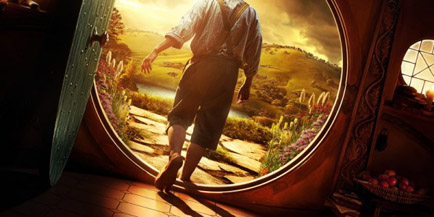Movie Review: The Hobbit
By Matthew Huntley
December 20, 2012
BoxOfficeProphets.com

Now, over a decade later, comes The Hobbit, based on J.R.R. Tolkien’s beloved children’s story that started it all, but with this film, which was once again directed by Jackson, there’s more of a reason to be excited about and invested in it. It has the all the makings of a delightful, adventure-filled children’s tale, which it duly lives up to, with a strong central character at its core. But like its brethren before it, it’s not exactly up to the “masterpiece” label. To me, there’s just something standard about all these films that hold them back from pure greatness.
Still, you can’t deny these films their virtues. As I mentioned, LOTR was a crowning technical achievement for its time, especially in regards to its sets, makeup, costumes and special effects, and The Hobbit, which takes place in the same universe, takes those elements and technology even further. This is a magnificent film too look at. It’s bright, colorful and incredibly sharp and convincing, even in the close-ups.
I’m still not sold on Jackson’s decision to shoot it at 48 frames per second (the standard is 24) as a means of giving it more detail; the effect actually makes the action appear sped up and the camera motion jerky, although I’m willing to accept this could be my eyes and brain not being used to it. Ultimately, however, the film is technically superior, especially in its long and aerial shots underneath and above Middle Earth’s mountains.
On a narrative level, the film is jolly and exciting, light and dark, and all-around fun. I know many people will extend their praise well beyond that, but I wonder if their opinions are simply a reflection of the giddiness they feel upon coming returning to this world and the memories of the former series, not to mention the book they probably enjoyed as kids. Regardless, I happen to have recently read Tolkien’s book and can veritably say that Jackson’s film captures its innocent spirit and humor. He fortunately keeps it within the realm of children’s fantasy and resists the urge of making it too dark, violent or gloomy just to cater to the older and more mature LOTR audience. Not that he couldn’t have done this and still made it worth our while, but I believe Jackson’s intentions were to be faithful to Tolkien’s prose, and that approach works because we seem inherently more willing to accept children’s fantasy over adult, perhaps because the concept of fantasy is inextricably linked to - and the product of - our inner child.
Whatever the psychological reasons, I felt more encapsulated and enamored by Middle Earth this time around than with LOTR, and I also felt more invested and charmed by the characters. The dwarves, elves, wizards, goblins, dragons, orcs and, of course, hobbits, ingratiated me, especially the titular hero, Bilbo Baggins (Martin Freeman). His short height, big, hairy feet and larger-than-life appetite make him instantly sympathetic and likable. He lives among many other hobbits in a peaceful little valley called the Shire, unexposed to harm and used to easy, quotidian routines like reading, smoking a pipe, tending to a garden, eating, snacking, being warmed by a cozy fire and sleeping in a soft bed. That’s how hobbits like it and Bilbo is no different.
Then one day, he’s visited by Gandalf the Grey (Ian McKellen), a tall and eloquent wizard, who asks him to take part in an adventure. But Bilbo isn’t interested, not even after 13 dwarves barge into his house, eat all of his food and ask him to play the part of “burglar” in their quest to return to the once-opulent Dwarf Kingdom of Erebor within Lonely Mountain. Their mission: take back their gold and other treasures from a sleeping dragon named Smaug. The dwarves are led by Thorin Oakenshield (Richard Armitage), grandson of the last ruling dwarf king, and we get the sneaking suspicion he’s after something more than just the gold.
If you’re at all familiar with the previous LOTR films, then a lot of The Hobbit will feel like more of the same, right down to the events of the plot. The group experiences several hurdles and conflicts as they trek to their far-off destination, including encounters with another wizard, trolls, orcs, elves, goblins and eagles. But even if the film does retread familiar territory, it’s altogether a better, more enjoyable story, and that’s probably because it contains a protagonist with whom we can identify.
LOTR suffered because it had too many characters, each competing for screen time, and while The Hobbit is also populated with several characters, Bilbo is at the heart of it and credit must be given to Martin Freeman for bringing him weight and dimension. At one point, after Bilbo discovers the infamous Ring and steals it from the pathetic and emaciated Gollum (once again, a motion-captured Andy Serkis), there’s a very important close-up that reveals Bilbo’s inner humanity, which will serve as the driving force for the rest of his journey.
While there were plenty of reasons to watch (and enjoy) The Lord of the Rings, it remains a series that was more admirable than likable, or even entertaining. The Hobbit is just as admirable, but with its engaging central figure, we’re provided more of a reason to invest our hearts in it and anticipate the next installment. Yes, Tolkien’s story, which was just over 300 pages, could have been told in a single movie - Jackson pads the narrative too much, especially with elongated fight scenes that could have been shorter, tighter and more tension-filled - but the characters manage to give it purpose. We hope and want to see them reach their destination, and even though we have little doubt they will, we care enough about them just to make sure.